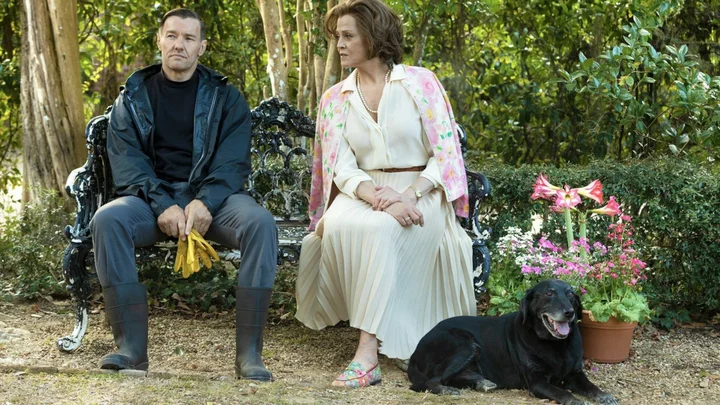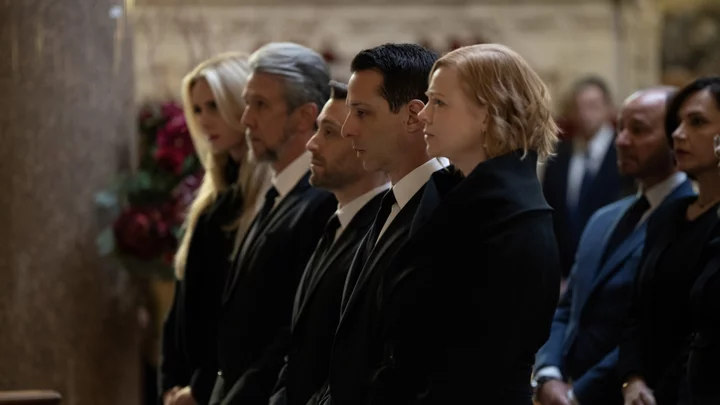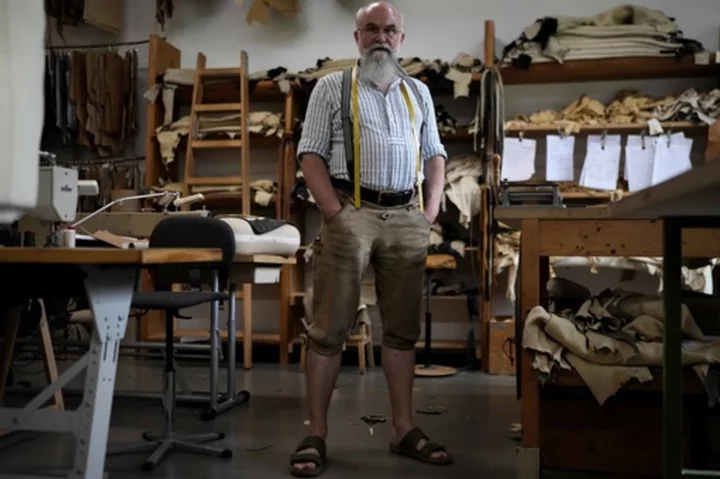To everything, there is a season, and it would appear that Paul Schrader’s season of love is upon us. I wouldn’t say that the writer of the nihilistic masterpiece Taxi Driver has exactly gone soft in his dotage. Nobody who’s seen First Reformed or The Card Counter or his Facebook page could possibly say that. But there is a blossom of hopefulness bursting at the heart of his latest film, Master Gardener. It's an optimism in the face of corruption that feels fresh coming from the filmmaker, here in the sixth decade of his career.
That’s not to say that his typical darkness isn’t on display. He didn’t exactly make The Princess Diaries. You can still find your complicated anti-hero type here, amid all the typical sorts of moral quandaries that Schrader’s built his reputation with. Master Gardener just makes some space for a sort of unspoken salvation, set against the thick weeds and the thorniness that we expect.
SEE ALSO: 50 films we can't wait to see this summerMaster Gardener is a film haunted by the horrors of the past.
Credit: Magnolia PicturesJoel Edgerton plays Narvel Roth, the head horticulturist at the esteemed Gracewood Gardens. Working the grounds of a historic antebellum-era estate, Narvel’s gentle demeanor and dirty coveralls brush incongruously against his severe high-and-tight haircut. And the tension of that contrast sets the stage for what will soon uncover itself.
What’s under the cover of those dirty coveralls, it’s far more sordid. Narvel stands staring at his bare torso in the mirror, where swastikas and the words “white power” are tattooed across his chest stare back. The moment is charged, but Edgerton keeps his performance just this side of inscrutable. For most of the film, Narvel remains a fairly closed book. Where many filmmakers would work hard to explicitly spell out the character’s redemption, Schrader isn’t so inclined. He allows Narvel’s actions to do the speaking, even as poetic inner thoughts work overtime in voiceover.
Master Gardener is the third film in the writer/director’s “Man in a Room” trilogy, after the aforementioned First Reformed and The Card Counter. And just like those earlier protagonists, Narvel narrates the film via passages from the journals he’s keeping. Edgerton speaks in broad metaphors – flatly delivered lines about seeds of love versus seeds of hate, and about how gardening represents a belief in things going to plan.
He is, in the way of all Schrader’s menfolk, haunted — in this case by brief nightmare flashes where we see his former life embedded in a neo-nazi gang, doing work as a contract killer. In Narvel’s present, he doesn’t seem to be actively seeking redemption – just a silent peace making pretty the flowerbeds and bushes of this former plantation’s soil. A soil that no doubt carries as much racial horror as does Narvel himself, deep in the heart of them. And those haunted pasts, the both of them, will inevitably bubble up into the present. Violence, after all, finds a way. Although not quite in the manner that we might anticipate from a revenge-fablist such as Schrader.
Sigourney Weaver gives her best performance in ages in Master Gardener.
Credit: Magnolia PicturesGracewood Gardens is owned and cultivated by the wealthy heiress Norma Haverhill, who is played by Sigourney Weaver in a series of pleated flowy skirts that can barely contain this woman’s seething hubris. Just watch the way she smoothes and pats them down as she sits just so, her Finishing School graces suffocating her every move. The staff of her estate (nearly all people of color) walk five steps behind her and on eggshells, painting the roses red in her queenly wake.
And Norma’s relationship with Narvel is even thornier. Norma is aware of his dark history, and she seems deeply, primally drawn to his past in ways that she, as a proper upstanding lady of the community, can’t outwardly articulate. Not in so many words, anyway. And definitely not outside the confines of her master bedroom.
So thank goodness we have in Weaver an actress so capable of transmitting a just-under-the-surface danger with just the smallest shift of brow. This is the lowkey meatiest role Weaver’s had in a generation, and what a blessing it is in watching her define this woman with all the sharp edges she can carve into her. Her Norma is a whirlwind of nasty propriety, a hurricane that leaves curated tablescapes in her wake. Every relationship she has is transactional. She can’t even name her dog anything but “Porch Dog” because, she says, she knew from the first moment that that’s all he’d ever be. As if the poor dog ever had a choice!
Master Gardener puts the “Heritage Not Hate” mindset squarely in its crosshairs.
Credit: Magnolia PicturesThe Haverhill family isn’t without its own buried secrets though. And Norma sits Narvel down one afternoon to ask him a favor in discreetly dealing with a slice of her own heritage that she’d rather keep hush-hush. It seems Norma’s sister’s daughter was the family’s black sheep, and so followed Norma’s grand-niece Maya (Quintessa Swindell) – who is “of mixed blood,” Norma makes a point of saying (and just watch the way Sigourney’s eyes say it – yikes). Maya has fallen in with a wayward crowd, and needs some tending. So won’t Narvel take Maya on as his apprentice?
Sure enough he will – as if the poor dog had a choice. But Maya proves eager to learn and well-suited to the work. And better still, she and Norval seem to have some sort of unarticulated deeper understanding of one another from the get-go. Swindell eyes Edgerton with a gently amused “Who the fuck is this weirdo?” fascination, and their scenes together discussing potting soil are as cautious as they are tender.
Schrader insistently keeps us guessing as to what the unspoken tension amounts to between these two, though. Is this a quiet romance forming, or something far more dangerous? The line stays uncertain for a long, tense time. What does Narvel’s impassiveness represent? What are we projecting onto him? And her? The seeds of love versus the seeds of hate and all that. Maya has her own dark history nipping at her heels too. And before you know it Sigourney Weaver is slamming down a glass of wine with the force of a megaton bomb.
Paul Schrader finds something to savor among the flowers.
Credit: Magnolia PicturesIt is at this point that Master Gardener begins flirting, in its subtle way, with the fact that it might just be telling the tale of a quietly blossoming romance between a former white supremacist and a biracial woman twenty-ish years his junior. And telling such a tale via the hands of one of the world’s most consistent provocateurs, no less!
Yet for all of that darkness and ambiguity, there is nevertheless, somehow and rather miraculously, an air of earnest goofiness permeating the picture too. And Sigourney being Sigourney gets it. She deals her Miss Havisham — excuse me — Haverhill the precise dosage of camp needed, giving the film's last act the drama that everybody else’s rigidly interiorized natures manifestly denies us.
Edgerton, with his hard face and small icy eyes, can also transmit danger in his sleep. Just two years back he gave terrifying cinematic life to one of the great Slavery-era nightmares in Barry Jenkins’ The Underground Railroad. And the small side-house that Narvel keeps on the grounds was no doubt the home to that exact type of man, several generations earlier. There is an echo in his casting here, for sure. But Edgerton also gave us Richard Loving, the sweetheart groom who helped break down miscegenation laws in Loving. He’s an actor who seems to like to straddle the difference – a dream and a nightmare, a lover and a warrior – and as such he’s perfectly suited to Schrader’s enigmatic aims.
Ambiguities aside, Schrader does give Narvel and Maya one deliriously beautiful dream sequence late in the film, where a night-time car ride explodes into riots of technicolor flowers around them. It’s orgasmic sincerity, sudden and unexpected, and truly lovely. But otherwise, the tone of the film and the romance remain muted, both visually and emotionally. The two often feel like marble figures posed in the frame; the sort that has been weathered by time, wrapped in vines and moss, but still standing. There are no enormous rhapsodic declarations. Just simple moving forward, handling the soil they’re dealt.
These are two wounded birds, finding unspoken solidarity in the shadows of an implacably thorny world. How long their garden will bloom beyond these final frames Schrader knows well enough to leave suspended, the start of an exhale or perhaps a deep perfumey sniff. Impossible though it may seem, the world’s seen far wilder. And so a gentility and honest-to-goodness sweetness is suddenly Schrader’s most disarming characteristic. Where the heck did our favorite Facebook provocateur go?
The Master Gardener is now in theaters.









